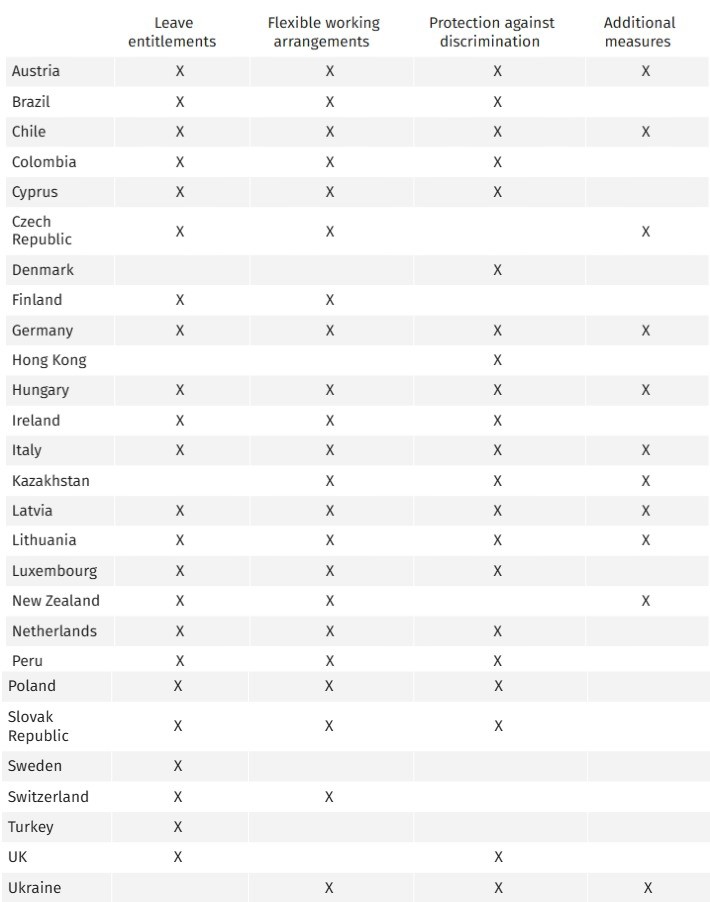Ius Laboris conducted a survey of EU and non-EU countries to understand how key jurisdictions grant rights and protections to caregivers in the workplace. In the landmark 2008 Coleman case, the European Court of Justice expanded EU anti-discrimination protections to include caregivers. Today, national legislation and case law (in the EU and elsewhere) grant varying protections to caregivers in the workplace.
Background
The EU Framework Directive for Equal Treatment in Employment and Occupation (the ‘Equal Treatment Directive’) aims to ensure that persons of a particular religion or belief, disability, age or sexual orientation are not discriminated against and enjoy equal treatment in the workplace. This includes (among other things) equal access to employment, vocational training, working conditions, promotions and compensation. The Directive covers both direct discrimination (i.e. differential treatment based on a specific characteristic) and indirect discrimination (i.e. any provision, criterion or practice which is apparently neutral but puts the people in the above categories at a disadvantage compared to others). Harassment based on those characteristics, creating a hostile environment, is deemed to be discrimination as well.
Although caregivers (i.e. family members or friends who provide care to individuals with disabilities, chronic illnesses, or other long-term needs) are not among the categories of individuals explicitly protected by the Equal Treatment Directive, they may nonetheless experience discrimination in the workplace due to their caregiving duties.
Key details The Coleman case: a turning point
In the case of Sharon Coleman vs. Attridge Law, a legal secretary claimed she was discriminated against by her employer due to her caregiving responsibilities for her disabled son. The ECJ ruled in her favor, establishing that ‘discrimination by association’ occurs where an individual experiences discrimination not because of their own characteristics, but because of their association with someone else who possesses a protected characteristic, such as disability. The ECJ held that this sort of discrimination is prohibited under the Equal Treatment Directive.
This decision was pivotal, as it explicitly extended anti-discrimination protections to caregivers, as individuals associated with persons with disabilities.
Global legal protections for caregivers
With this in mind, we conducted a survey among EU and non-EU countries, with the aim of understanding which jurisdictions grant specific rights and protections to caregivers in the workplace, and to what extent. Though the scope and effectiveness of these measures may vary, employers must be aware of them to avoid taking actions, criteria or practices which may discriminate against caregivers.
Among the measures implemented by the countries which participated in our survey are:
Leave entitlements (including those granted to a disabled person’s family, relatives and/or carers). These leaves, which are the most commonly implemented measures, are crucial for caregivers to provide support during emergencies or long-term care situations. Being aware of these entitlements is essential for employers to organize their business and balance the employer’s and caregivers’ needs adequately.
Flexible working arrangements are also common. This may include the option for caregiver employees to adjust their working hours and/or to work remotely to accommodate their needs.
In addition, almost all the countries that participated in our survey prohibit discrimination based on caregiving responsibilities, either based on general antidiscrimination laws or according to provisions specifically addressed to caregivers.
A few jurisdictions provide additional rights and protections for caregivers, such as limitations on work trips or relocation, additional holidays, protection against dismissal, or additional allowances granted by the State. Below is a chart summarizing the main measures implemented by these countries.

Tips for employers Employers can take several proactive steps to ensure compliance with laws granting rights and protections to caregivers in the workplace, while at the same time managing the workforce to maintain operational efficiency:
Familiarity with laws: employers should be well-versed with the relevant laws and regulations that protect caregivers from discrimination including unfavorable treatment, denial of benefits, or inappropriate comments related to caregiving responsibilities.
Equitable treatment: employers should ensure that all employment decisions (including hiring, promotion, compensation and performance evaluations) are based on objective criteria and are free from bias related to caregiving responsibilities. For example, performance evaluation criteria should focus on outcomes and productivity rather than physical presence in the office, especially if the absence is due to care responsibilities.
Flexible work arrangements and leave policies: flexible work options (e.g. remote working, part-time work) may be offered to caregivers even in those jurisdictions where they are not mandated by law.
Anti-discrimination policies: employers should develop and implement clear anti-discrimination policies that specifically address caregiver discrimination in compliance with applicable law. These policies should be easily accessible to all staff.
Training and awareness: employers should provide regular training for management, HR and staff on diversity, inclusion, and the importance of supporting employees with caregiving responsibilities.

Written by Aldo Palumbo, Alessia Barbante, Stefano Perazzelli, Toffoletto De Luca Tamajo